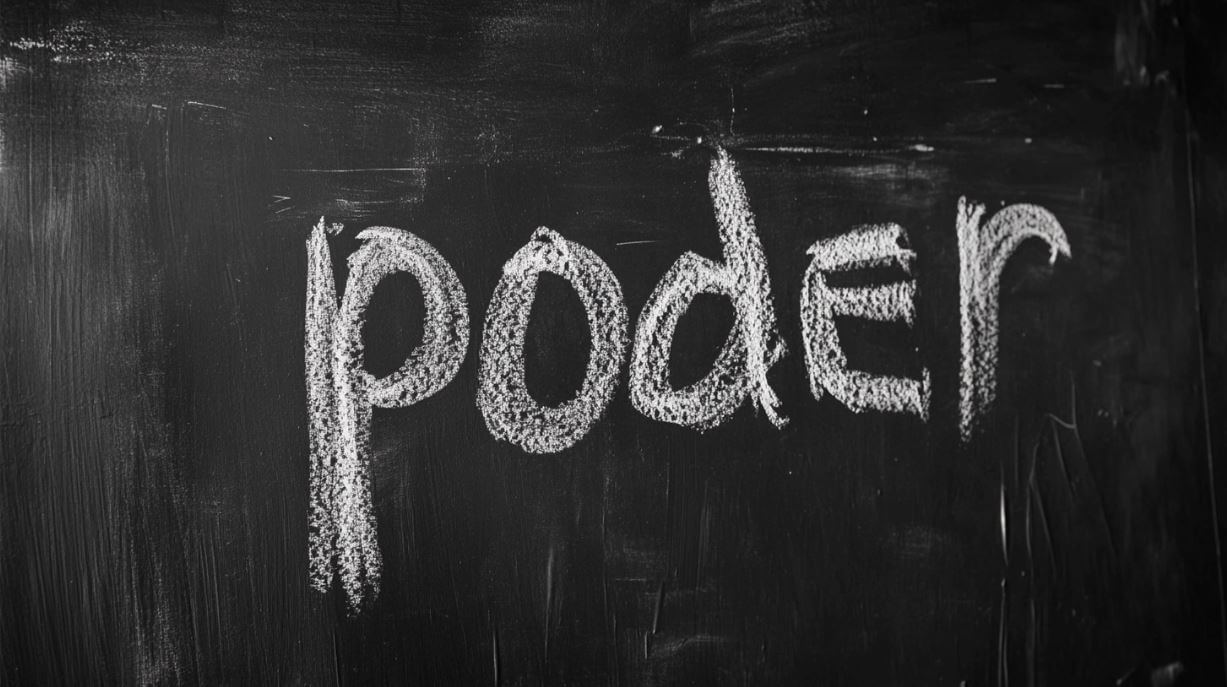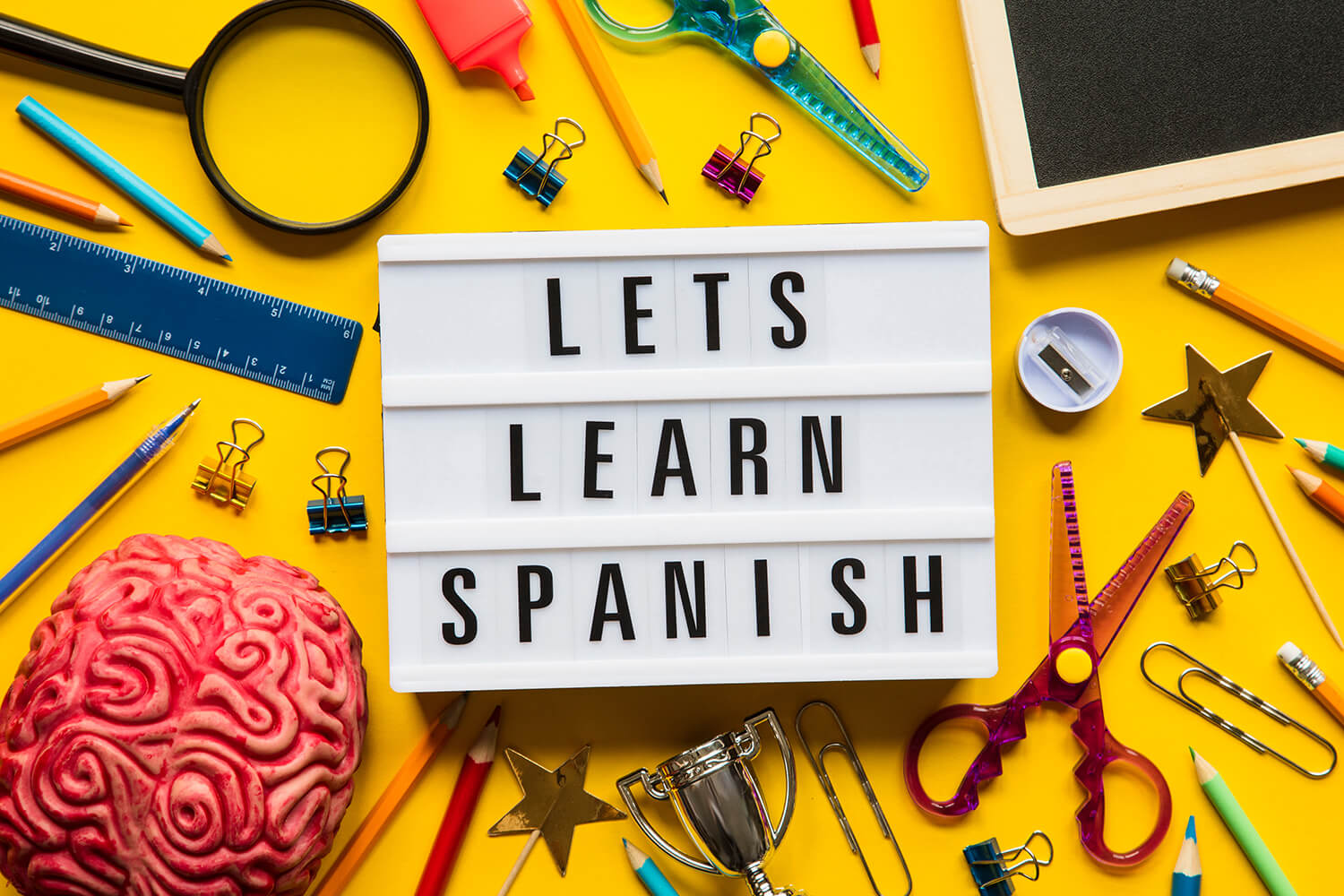Hello there friends! If you know that "querer es poder" (to want is to be able), then you'll understand that this poder conjugation is one of the most important in Spanish. The conjugation of "poder" is essential for the Spanish language, as it appears in a variety of contexts useful for effective communication. If you're not clear on it, don't worry! In this guide, you will learn everything you need.
Get ready to learn all about the conjugation of "poder" in different tenses and the best way to put it into practice. You can achieve it!

The verb "poder" - essential for solid communication!
The verb "poder" serves as a fundamental tool for Spanish students to express their capabilities and limitations. Understanding its usage across different situations can be particularly challenging. Example:
- Asking for permission - "¿Puedo usar el automóvil?" (Can I use the car?)
- Tolerating a situation - "No puedo seguir adelante." (I can't go on.)
- Being able to do an activity - "¡Puedo hacerlo!" (I can do it!)
Uses of the verb "poder" in Spanish:
First relevant aspect that you can't overlook is that the different conjugated forms of "poder" are always accompanied by an infinitive verb.
It's important to mention that the verb "poder" is part of the list of irregular verbs. This means that the conjugation of "poder"includes variations. Both in its written form and pronunciation. It also does not follow the pattern of regular verbs, but instead has unique conjugations that must be memorized.
Conjugation of "poder" - Keys to Fluent Conversation!
Now that you know what the verb "poder" is about and how it's used in Spanish, it's a good time to tell you how to conjugate "poder" correctly. As you may know, there are different verb tenses in which this verb is conjugated, but don't worry! We'll do it in a simple way so you can understand each one of them. Let's get into it right away!
"Poder" in the indicative tense
We refer to the indicative tense to talk about specific situations. The conjugation of "poder" appears in different indicative tenses that we'll see right now.
Verb "poder" in the present indicative
Describes actions happening right now or in the near future. In this case, the root of the verb changes to "pue" in all forms, except for "nosotros," whose root remains as "pod." Generally, "poder" in the present indicative tense translates as "can."
- Yo puedo. (I can)
- Tú puedes.(You can)
- Ella/Él/Usted puede. (She/he/You can)
- Nosotros podemos. (We can)
- Vosotros podréis.(You can)
- Ellos / Uds. pueden. (They / You all can)
Examples with sentences:
- Yo puedo ser el primer estudiante de español en dominar la conjugación de poder. / I can be the first Spanish student to master the conjugation of "poder."
- Los niños no pueden salir a jugar porque está lloviendo./ The children can't go out to play because it's raining.
- María puede bailar durante mucho tiempo sin agotarse. María can dance for a long time without getting tired.

Verb poder past tense conjugation
Now that you've mastered the present tense, you should learn more about the poder preterite conjugation. In this case, the root of the verb changes to "pud" in Spanish, which in English means "was able to" or "managed to." It also could mean “could” in some cases.
This poder conjugation preterite is used to refer to actions that have already happened. The past tense conjugation of "poder" is really simple.
- Yo pude. (I was able to/could)
- Tú pudiste. (You were able to/could)
- Ella/Él/Usted pudo. (He/she was able/could)
- Nosotros pudimos. (We were able to/could)
- Vosotros pudisteis. (You were able to/could)
- Ellos / Uds. pueden. (They / You all were able to/could)
Examples with sentences:
- El mes pasado Juan no pudo hacer el examen de admisión. / Last month, Juan wasn’t able to/couldn't take the entrance exam.
- ¿No pudiste llamar para avisar que llegarías tarde? / Weren’t you able to call to let them know you'd be late?
- Intentamos ganar el torneo, pero no pudimos. / We tried to win the tournament, but we were not able to (or “we couldn’t”).
Verb “poder” imperfect conjugation
The poder imperfect conjugation is useful for talking about past actions that used to happen. In this case, the root of the word is "pod" in Spanish.
- Yo podía. (I could)
- Tú podías. (You could)
- Ella/Él/Usted podía. (She/he/You could)
- Nosotros podíamos. (We could)
- Vosotros podíais. (You could)
- Ellos / Uds. podían. (They could / You all could)
Examples with sentences:
- Cuando éramos bebés no podíamos caminar, ni comer solos. / When we were babies, we couldn't walk or eat by ourselves.
- Yo a los 20 años podía correr mucho más que ahora. / When I was 20 years old, I could run much more than I can now.
- Hace 5 años, Luisa podía permanecer mucho tiempo viendo la televisión. / 5 years ago, Luisa could spend a long time watching television.
Verb "poder" in present continuous indicative
The present continuous indicative is useful when referring to situations that are happening right now and is also called "present progressive."
- Yo estoy pudiendo (I am able to.)
- Tú estás pudiendo. (You are able to.)
- Ella/Él/Usted está pudiendo. (She/He/You is able to.)
- Nosotros estamos pudiendo. (We are able to.)
- Vosotros estáis pudiendo. (You (plural) are able to.)
- Ellos / Uds. están pudiendo. (They are able to.)
Examples with sentences:
- A pesar de la lluvia, el equipo estaba pudiendo avanzar. / Despite the rain, the team is able to advance.
- Estoy pudiendo sobrellevar esta etapa tan complicada. / I am able to cope with this complicated stage.
- Juan y yo estamos pudiendo resolver todos los problemas matemáticos. / Juan and I are able to solve all the math problems.

Verb "poder" in informal future indicative
This conjugation of "poder" is used to talk about actions we will perform in the near future.
- Yo voy a poder. (I will be able to.)
- Tú vas a poder. (You will be able to.)
- Ella/Él va a poder. (He/She will be able to.)
- Nosotros vamos a poder. (We will be able to.)
- Vosotros vais a poder. (You (plural) will be able to.)
- Ellos van a poder. (They will be able to.)
Examples with sentences:
- Yo voy a poder aprender a conjugar el verbo poder hoy mismo. / I will be able to learn to conjugate the verb "poder" today itself.
- Luis y Carla van a poder completar el examen con éxito. / Luis and Carla will be able to complete the exam successfully.
- ¿Vas a poder venir a verme? / Will you be able to come see me?
Verb "poder" in future indicative
In this case, the conjugation of "poder" is used for actions that will happen in the future, which is known as "simple future."
- Yo podría. (I will be able to.)
- Tú podrías. (You will be able to.)
- Ella/Él/Usted podría. (He/She will be able to.)
- Nosotros podríamos. (We will be able to.)
- Vosotros podríais.(You (plural) will be able to.)
- Ellos/Ustedes podrían. (They will be able to.)
Examples with sentences:
- Yo podré cambiar mi estilo de vida. / I will be able to change my lifestyle.
- Tú podrás comprar tu casa propia. / You will be able to buy your own house.
Verb "poder" in conditional indicative
This conjugation of "poder" is ideal for referring to situations that could happen in the future (hypothetical). One specific usage is to mention something you could do in the future, however, you have decided not and instead decided to choose a different option (see first example sentence below).
- Yo podría. (I could)
- Tú podrías. (You could)
- Ella/Él/Usted podría. (She/he/You could)
- Nosotros podríamos. (We could)
- Vosotros podríais. (You could)
- Ellos/Uds. podrían. (They could)
Examples with sentences:
- Yo podría comprar un coche nuevo en el futuro, pero prefiero comprarme una casa primero. / I could buy a new car in the future, but I prefer to buy a house first.
- Laura podría ganar el trofeo, pero necesita puntos extras. / Laura could win the trophy, but she needs extra points.
Verb "poder" in present perfect indicative
It may seem complex, but it's quite simple. This mode of conjugation of poder is used to talk about events that happened recently or are in the past but still ongoing. This is also known as the present perfect.
- Yo (he podido) (I have been able to)
- Tú (has podido) (You have been able to.)
- Ella/Él/Usted (ha podido) (He/She/You has been able to.)
- Nosotros (hemos podido) (We have been able to.)
- Vosotros (habéis podido) (You (plural) have been able to.
- Ellos/Uds. (han podido) (They have been able to.)
Examples with sentences:
- Él ha podido llegar a tiempo al examen.
- Hemos podido comprar boletos para el concierto.
- He has been able to arrive on time for the exam.
- We have been able to buy tickets for the concert.
Verb "poder" in past perfect indicative
When talking about the “poder past tense conjugation” it refers to speaking about situations that occurred before others.
- Yo había podido. (I had been able to)
- Tú habías podido. (You had been able to)
- Ella/Él/Ud. había podido. (She/he/You had been able to)
- Nosotros habíamos podido. (We had been able to)
- Vosotros habíais podido. (You had been able to)
- Ellos / Uds. habían podido. (They / You all had been able to)
Examples with sentences:
- Cuando llegó Juan, yo había podido escapar. / When Juan arrived, I had been able to escape.
- Con el tiempo suficiente, habíamos podido terminar todo. / With enough time, we had been able to finish everything.
Verb "poder" in future perfect indicative
This verb tense is useful for referring to an event that will happen in the future once another action has occurred.
- Yo habré podido.(I will have been able to.)
- Tú habrás podido. (You will have been able to.)
- Ella/Él/Usted habrá podido. (She/He/You will have been able to.)
- Nosotros habremos podido. (We will have been able to.)
- Vosotros habréis podido. (You (plural) will have been able to.)
- Ellos/Uds. habrán podido. (They/You all will have been able to.)
Example with sentences:
- Para diciembre, yo habré podido terminar la carrera. / By December, I will have been able to finish my degree.
- Tú habrás podido pagar el préstamo para el año que viene. / You will have been able to pay off the loan by next year.

Verb "poder" in conditional perfect indicative
This conjugation is used to talk about an action that could have happened in the past but wasn't possible due to another.
- Yo habría podido. (I would have been able to.)
- Tú habrías podido. (You would have been able to.)
- Ella/Él/Usted habría podido. (She/He/You would have been able to.)
- Nosotros habríamos podido. (We would have been able to.)
- Vosotros habríais podido. (You (plural) would have been able to.)
- Ellos/Uds. habrían podido. (They/You all would have been able to.)
Examples with sentences:
- Yo habría podido hacer una exposición en el parque si no lloviera.
- Nosotros habríamos podido comprar la cena, pero se nos perdió el dinero.
- I would have been able to give a presentation in the park if it hadn't rained.
- We would have been able to buy dinner, but we lost our money.
Subjunctive verb tenses of "poder"
Let's expand a bit more on your knowledge of the conjugation of "poder," taking a step forward. Now we'll see everything about the subjunctive conjugation of "poder."
Keep in mind that, although these verb tenses are not common in English, they play a crucial role in Spanish. In short, they serve to reflect needs, doubts, desires, uncertainty, possibility, and judgment. Let's look at each of these conjugations!
Verb "poder" in present subjunctive
If you learn the forms of the verb "poder" in the present indicative, this will be a piece of cake for you! It's just a matter of replacing the letter "e" with the letter "a." This form of conjugation of "poder" is used to describe a fact of doubt, longing, desire, or uncertainty.
- Yo (pueda).(I may)
- Tú (puedas). (You may)
- Ella/Él/Usted (pueda). (He/she/you may)
- Nosotros (podamos). (We may)
- Vosotros (podáis). (You may)
- Ellos/Uds (pueda). (They/You all may)
Examples with sentences:
- Ojalá podamos llevarnos el premio mayor en la competencia.
- Quizás nunca pueda volver a ver a mi mejor amigo.
- Hopefully, we may win the grand prize in the competition.
- Perhaps I may never see my best friend again.
Verb "poder" in imperfect subjunctive
In poder subjunctive conjugation, the root is "pud." You should know that there are two correct ways to use this conjugation, and both are shown below.
- Yo pudiese/pudiera. (I could.)
- Tú pudieses/pudieras. (You could.)
- Ella/Él/Usted pudiese/pudiera. (He/She/You could.)
- Nosotros pudiésemos/pudiéramos. (We could.)
- Vosotros pudierais. (You (plural) could.)
- Ellos/Uds. pudiesen/pudieron. (They/You all could.)
Examples with sentences:
- Si pudiese recordar la contraseña, usaría mi red social. / If I could remember the password, I would use my social network.
- Si pudiéramos, nos iríamos de vacaciones. / If we could, we would go on vacation.

Verb "poder" in future subjunctive
The root of the word remains as "pud" for this type of conjugation, which is used to talk about hypothetical events that may happen in the future. It’s not such a commonly used tense by Spanish native speakers.
- Yo (pudiente). (I may be able to).
- Tú (pudientes). (You may be able to).)
- Ella/Él/Usted (pudiente). (He/She/You may be able to).
- Nosotros (pudiéremos). (We may be able to).
- Vosotros (pudieseis). (You (plural) may be able to)
- Ellos/Uds. (pudieren). (They/You all may be able to).
Examples with sentences:
- Espero que puedas visitarnos el próximo fin de semana. / I hope you may be able to visit us next weekend.
- Si te esfuerzas, podrás alcanzar tus sueños. / If you make an effort, you may be able to achieve your dreams.
Verb "poder" in present perfect subjunctive
It is used to describe past events that are related to the present and to indicate an act that could have happened at a specific moment in the future.
- Yo (haya podido).
- Tú (hayas podido).
- Ella/Él/Usted (haya podido).
- Nosotros (hayamos podido).
- Vosotros (hayáis podido).
- Ellos/Ustedes (hayan podido).
Examples with sentences:
- Que bueno que hayas podido encontrar lo que estabas buscando. / It's good that you may have been able to find what you were looking for.
- Nos entristece que no hayamos podido aprender a andar en bicicleta. / We're sad that we may not have been able to learn to ride a bike.
------------------------------------------------------------------------------------------------------------------------
Verb "poder" in past perfect subjunctive
In this case, it is used when talking about something that could have happened in the past if things had been different.
- Yo (hubiera podido). (I might have been able to).
- Tú (hubieras podido). (You might have been able to).
- Ella/Él/Usted (hubiera podido).(He/She/You might have been able to).
- Nosotros (hubiéramos podido). (We might have been able to).
- Vosotros (hubieras podido).( You might have been able to).
- Ellos/Uds. (hubieran podido). (They / You all might have been able to).
Examples with sentences:
- Si no hubieras podido caminar, te dolería la espalda mucho más.
- Hubiera podido llegar a tiempo, pero perdí mi cartera.
- If you hadn't been able to walk, your back would hurt much more.
- I might have been able to arrive on time, but I lost my wallet.
Verb "poder" in future perfect subjunctive
This form of conjugation of "poder" is used to talk about events resulting from a hypothetical scenario in the future.
- Yo (hubiere podido). (may have been able to).
- Tú (hubieres podido). (You may have been able to).
- Ella/Él/Usted (hubiere podido). (He/She/You may have been able to).
- Nosotros (hubiéremos podido). (We may have been able to).
- Vosotros (hubiereis podido). (You (plural) may have been able to).
- Ellos / Uds. (hubieren podido). (They / You all may have been able to).
Examples with sentences:
- Espero que para mañana ya hubieres podido terminar tu tarea. / I hope that by tomorrow you may have been able to finish your homework.
- Si Laura estudia mucho, hubiere podido aprender todas las lecciones para el examen. / If Laura studies hard, she may have been able to learn all the lessons for the exam.
Activities for Practice and Learning:
Now that you know everything about the conjugation of "poder" in each tense, it's time to enjoy some simple activities to keep learning! These activities will help you use the verb "poder" correctly in different tenses.
Challenge of Hypothetical Situations:
With some friends, write down three hypothetical situations from the future and the past, and try to use the corresponding tense of "poder" for each of the sentences.
Create a Story:
Craft a short story, using the verb "poder" in different tenses, to build a unique and entertaining narrative. This is an ideal way to understand how to place the verb according to the tense.

Test Your Knowledge of "Poder" Conjugations!
Are you ready to put everything you've learned about the conjugation of "poder" to the test? Try this quick quiz (answers are at the end of the article):
What is the correct conjugation of "poder" in the present indicative for the following sentence: “yo _____ bailar break dance”?
Podré
Pude
Puedo
What is the correct form to conjugate the verb "poder" in the past perfect subjunctive to complete the following sentence: "Si hubiera estudiado más, yo _____ resolver el problema"?
a) pude
b) puedo
c) hubiera podido
What would be the appropriate form to conjugate the verb "poder" in the future subjunctive for the following situation: "Espero que tú _____ viajar por el mundo cuando seas mayor"?
a) podrás
b) puedas
c) pudieras
Extra Question:
Which of these examples of verb tenses belongs to the conjugation of "poder" in the indicative?
Hubiere podido
Hubiera podido
Habría podido
Congratulations!
If you add these types of activities to your daily routine, you can improve your knowledge and practice of "poder" conjugation like a true expert. Keep learning more every day!
P.S. You can check the quiz answers at the end of this article.
Final Thoughts on the Conjugation of "Poder"
This journey through the verb tenses of "poder" has brought us to this point. This guide is not only an option to learn the most important aspects of each tense, but also crucial for adapting your communication to different contexts and expressing yourself in a creative and fluent manner.
Learning a new language doesn't have to be complicated. Make sure to experience it in a fun way. Also, don't be afraid to make mistakes! We all grow day by day through effort and dedication.

You can also use other means to learn languages such as music, reading, movies, and even idioms. If you're someone who wants to go further, we invite you to check out our blog "Frases del inglés al español: 327 expresiones, refranes y traducciones idiomáticas", an ideal text to delve much deeper into the words that could be useful on your journey to learning Spanish.
Answers: Question 1: c) puedo, Question 2: c) hubiera podido, Question 3: b) puedas, Extra Question: c) habría podido